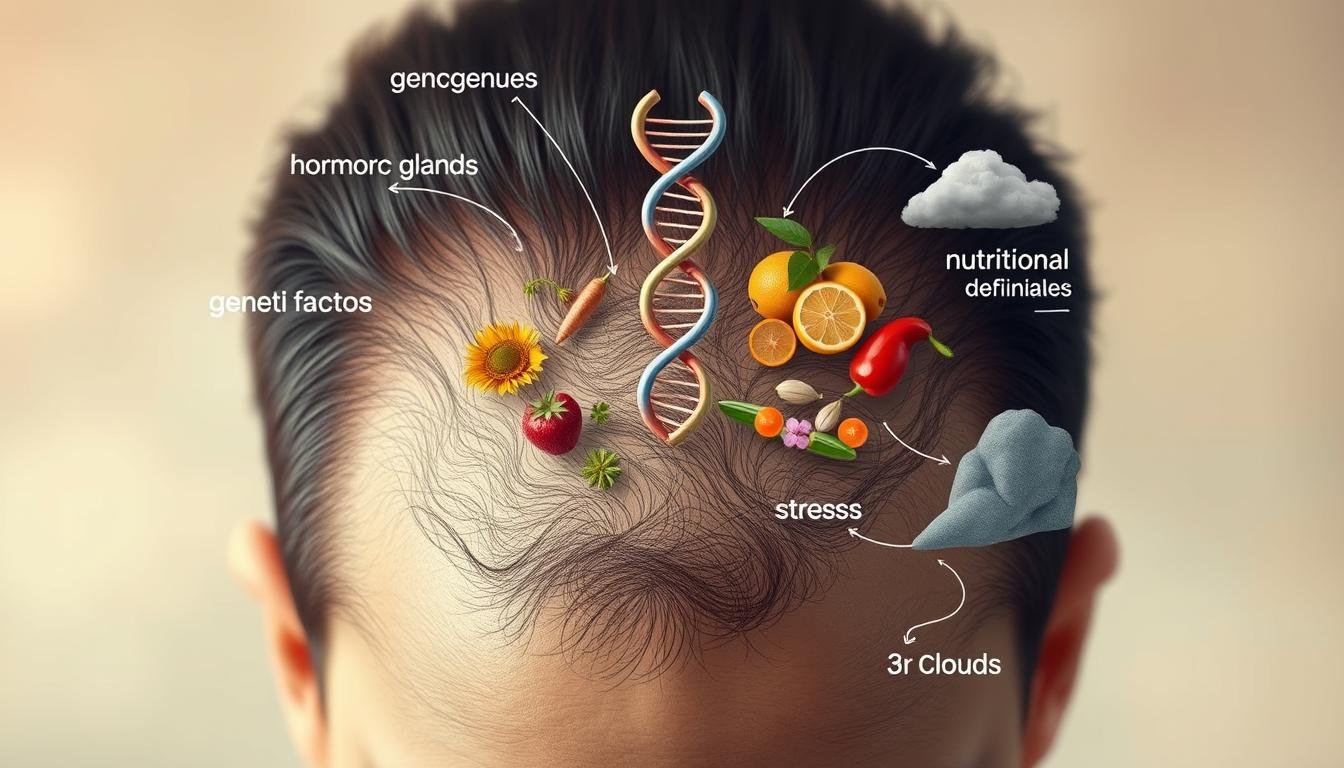What Causes Hair Loss?
Did you know that over 80 million Americans suffer from some form of hair loss? This widespread issue affects both men and women, often starting as early as the teenage years. Understanding the underlying causes of hair loss is the first step in addressing this common concern and restoring a healthy, vibrant head of hair. From genetic factors to hormonal imbalances, nutritional deficiencies, and environmental stressors, there are a myriad of potential culprits behind thinning locks and receding hairlines.
Key Takeaways
- Hair Loss affects over 80 million Americans, impacting both men and women.
- Numerous factors, from genetics and hormones to nutrition and stress, can contribute to hair thinning and shedding.
- Understanding the underlying causes is crucial for addressing Hair Loss and finding effective solutions.
- Exploring common causes, such as genetic predisposition, hormonal changes, and medical conditions, can provide valuable insights.
- Addressing lifestyle factors, including diet, chemical treatments, and environmental exposures, can also help promote healthy hair growth.
Understanding Hair Growth Cycles
The hair on our heads goes through a continuous cycle of growth and rest. This cycle, known as the hair growth cycle, consists of three main phases: the anagen phase, the catagen phase, and the telogen phase. Understanding these phases is crucial in comprehending the underlying causes of Hair Loss and thinning.
The Anagen Phase
The anagen phase is the active growth phase of the hair cycle. During this phase, the hair follicles are in their most productive state, producing new hair strands at a rate of approximately 1 centimeter per month. This phase can last anywhere from 2 to 7 years, and it is the longest phase of the hair growth cycle.
The Catagen Phase
The catagen phase is the transitional phase, where the hair follicle begins to shrink and detach from the blood supply. This phase typically lasts around 2 to 3 weeks and serves as a bridge between the active growth and the resting phases of the hair growth cycle.
The Telogen Phase
The telogen phase is the resting phase, where the hair follicle remains dormant, and the hair strand is eventually shed. This phase can last for about 2 to 4 months, after which the hair follicle will either enter a new anagen phase or remain in the telogen phase, leading to a reduction in overall hair density.
Disruptions in the normal hair growth cycle can contribute to various forms of Hair Loss, such as androgenetic alopecia, telogen effluvium, and alopecia areata. Understanding these phases and the factors that can influence them is crucial in developing effective strategies for maintaining healthy hair and preventing or managing hair loss.
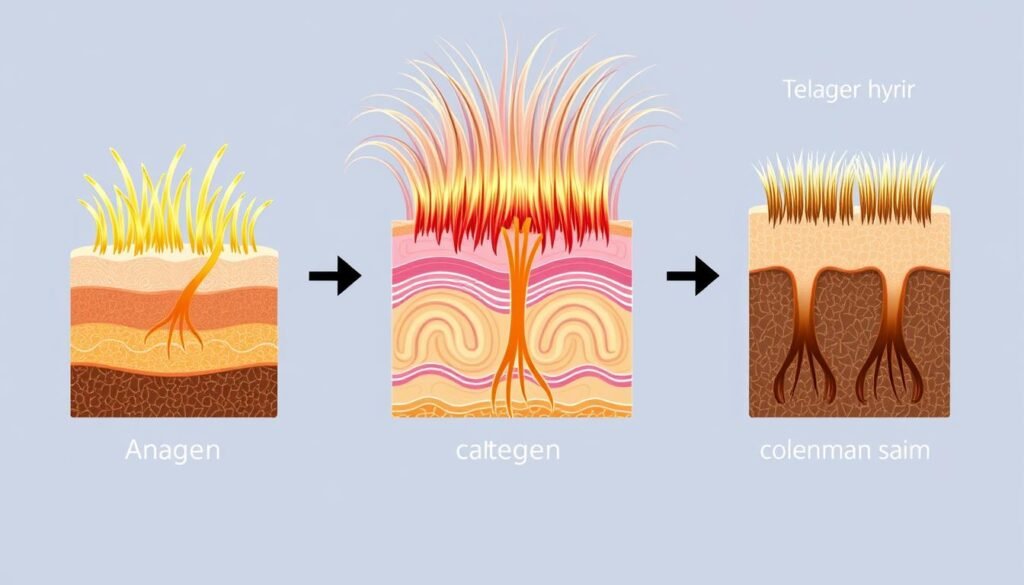
“healthy hair growth is a delicate balance between the different phases of the hair growth cycle.”
Common Causes of Hair Loss
Hair loss can be a frustrating experience, and understanding its underlying causes is the first step towards finding solutions. Among the most common factors contributing to hereditary hair loss, genetic predisposition and hormonal changes play a significant role.
Genetic Factors
Hereditary hair loss, also known as male pattern baldness and female pattern baldness, is a common condition that affects millions of people worldwide. This type of hair loss is primarily caused by genetic factors that can be passed down from generation to generation. Individuals with a family history of hair loss are more likely to experience thinning or receding hairlines as they age.
Hormonal Changes
Hormonal fluctuations can also lead to hair loss, particularly in women. Conditions such as polycystic ovarian syndrome (PCOS) and thyroid disorders can disrupt the body’s hormonal balance, resulting in excessive shedding or thinning of hair. Pregnancy, menopause, and certain medications can also trigger hormonal changes that contribute to female hair loss causes.
Nutritional Deficiencies
Inadequate intake of essential vitamins, minerals, and proteins can have a significant impact on hair health. Deficiencies in nutrients like iron, zinc, biotin, or protein can lead to male pattern baldness causes and hereditary hair loss causes. Ensuring a balanced diet rich in these nutrients can help support healthy hair growth and prevent excessive shedding.
| Genetic Factors | Hormonal Changes | Nutritional Deficiencies |
|---|---|---|
| Family history of hair loss | Polycystic ovarian syndrome (PCOS) | Iron deficiency |
| Male pattern baldness | Thyroid disorders | Zinc deficiency |
| Female pattern baldness | Pregnancy and menopause | Biotin deficiency |
| Inherited hair loss traits | Certain medications | Protein deficiency |
By understanding these common causes of hair loss, individuals can take proactive steps to address the underlying issues and improve the health and appearance of their hair.

Medical Conditions Linked to Hair Loss
Hair loss can be a common symptom of various medical conditions, some of which are autoimmune disorders, hormonal imbalances, and scalp infections. Understanding the underlying causes is crucial for effectively addressing and managing hair loss.
Alopecia Areata
Alopecia areata is an autoimmune disorder that triggers the body’s immune system to attack healthy hair follicles, leading to patchy hair loss. This condition can affect the scalp, eyebrows, and other parts of the body. While the exact causes of alopecia areata are not fully understood, it is believed to involve a combination of genetic and environmental factors.
Thyroid Disorders
Imbalances in thyroid hormones can significantly impact hair growth. Both hyperthyroidism (overactive thyroid) and hypothyroidism (underactive thyroid) can contribute to medical hair loss. Proper diagnosis and management of thyroid disorders through medication and lifestyle modifications can help restore normal hair growth.
Scalp Infections
Fungal or bacterial infections on the scalp can disrupt the normal hair growth cycle and lead to alopecia causes. Conditions like tinea capitis (ringworm) and seborrheic dermatitis can cause inflammation and damage to the hair follicles, resulting in hair loss. Prompt treatment with antifungal or antibacterial medications is essential to address these scalp infections and promote hair regrowth.
It is important to consult with a healthcare professional to identify the underlying medical condition and receive appropriate treatment for alopecia areata causes and other hair loss-related issues. Addressing the root cause can help mitigate the impact on hair health and encourage healthy hair growth.
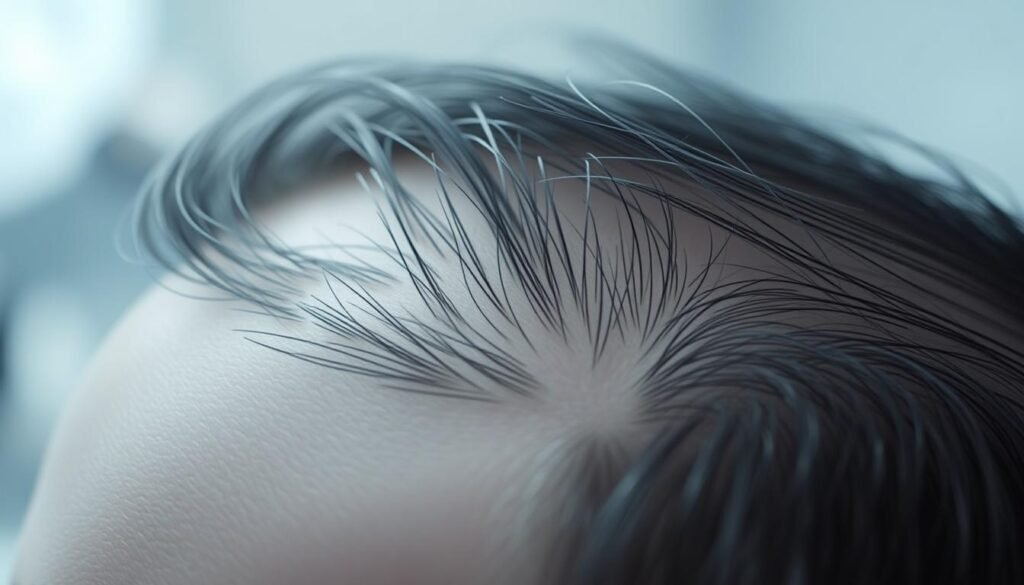
Environmental Factors Affecting Hair Health
While genetics, hormones, and medical conditions can play a significant role in hair loss, the environment we live in can also have a profound impact on the health and vitality of our locks. From the quality of the air we breathe to the styling techniques we employ, various environmental factors can contribute to environmental hair damage, chemical hair treatments, and heat styling damage.
Pollution: A Hair-Raising Concern
Exposure to air pollution, including particulate matter, heavy metals, and industrial chemicals, can wreak havoc on our hair. These pollutants can penetrate the hair shaft, causing dryness, breakage, and even discoloration. Regular exposure to polluted air can lead to an accumulation of these harmful substances, gradually damaging the overall health and appearance of our hair.
The Perils of Chemical Treatments
Chemical hair treatments, such as coloring, bleaching, and straightening, can be particularly damaging to the hair. These harsh processes can strip the hair of its natural oils, leading to dryness, brittleness, and increased susceptibility to breakage. Overuse of chemical treatments can also compromise the integrity of the hair’s structure, making it more vulnerable to environmental stressors.
The Scorching Impact of Heat Exposure
Excessive use of heat-styling tools, such as blow dryers, curling irons, and straighteners, can also contribute to environmental hair damage. The intense heat can cause the hair’s protein structure to break down, leading to frizz, split ends, and overall dullness. Prolonged exposure to high temperatures can also dehydrate the hair, making it more prone to breakage and loss.
| Environmental Factor | Impact on Hair Health | Preventive Measures |
|---|---|---|
| Pollution | Dryness, breakage, discoloration | Use a clarifying shampoo, wear a hat or scarf when outdoors |
| Chemical Treatments | Dryness, brittleness, increased breakage | Limit chemical treatments, use a deep conditioning treatment |
| Heat Exposure | Protein breakdown, frizz, split ends | Reduce heat styling, use a heat-protective styling product |

By understanding the impact of these environmental factors on hair health, individuals can take proactive steps to mitigate the damage and maintain the strength, shine, and resilience of their hair.
Stress and Its Impact on Hair Loss
Stress is a common culprit behind many health issues, including hair loss. The relationship between stress and hair loss is complex, with various types of stress impacting the hair growth cycle in different ways. Understanding the impact of stress on hair health is crucial for effectively managing stress-related hair loss.
Types of Stress
Stress can manifest in different forms, each with its own effect on the body and hair growth. Physical stress, such as illness, injury, or intense physical activity, can trigger a stress response that disrupts the normal hair growth cycle. Emotional stress, stemming from personal or professional challenges, can also have a significant impact on hair health. Psychological stress, caused by mental or emotional strain, can further compound the problem, leading to a vicious cycle of stress and hair loss.
Stress-Induced Hair Loss
One of the primary ways stress affects hair loss is through a condition called telogen effluvium. This type of hair loss occurs when a significant number of hair follicles are pushed into the telogen (resting) phase, causing excessive shedding. The causes of telogen effluvium can include physical or emotional stress, hormonal changes, and certain medical conditions. Identifying and addressing the underlying causes of stress-related hair loss is crucial for regaining hair health and preventing further loss.
| Stress Type | Impact on Hair |
|---|---|
| Physical Stress | Disrupts normal hair growth cycle, leading to increased shedding |
| Emotional Stress | Contributes to telogen effluvium and exacerbates stress-related hair loss |
| Psychological Stress | Compounds the problem, creating a vicious cycle of stress and hair loss |
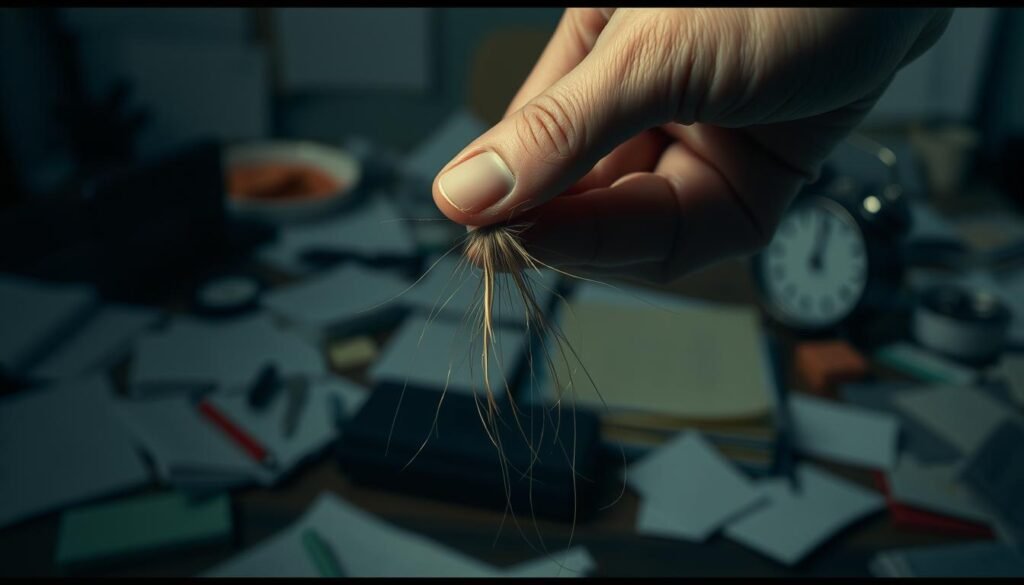
Effectively managing stress through a combination of lifestyle changes, stress-reduction techniques, and seeking professional support can help mitigate the impact of stress on hair health and promote healthy hair growth.
The Role of Medications in Hair Loss
Medication-induced hair loss is a common, yet often overlooked, side effect that can significantly impact an individual’s appearance and self-confidence. While many people associate hair loss with genetics or aging, certain prescription drugs can also play a role in thinning or shedding hair.
Common Drugs Linked to Hair Loss
Several classes of medications have been associated with medication-induced hair loss, or drug side effects. These include:
- Antidepressants
- Blood thinners
- Cancer treatments
- Cholesterol-lowering drugs
- Hormonal contraceptives
- Immunosuppressants
The mechanism by which these medications can trigger medication-induced hair loss varies, but often involves disrupting the normal hair growth cycle or altering hormonal balances within the body.
Treatment Options
For individuals experiencing drug side effects that result in hair loss, there are several potential treatment options to consider:
- Consulting with a healthcare provider to explore alternative medications that may have a lower impact on hair health.
- Incorporating targeted hair growth supplements, such as those containing biotin or saw palmetto, to support follicle health.
- Utilizing topical treatments, like minoxidil, to stimulate new hair growth and slow further shedding.
- Exploring procedures like platelet-rich plasma (PRP) therapy or low-level laser therapy to revitalize dormant hair follicles.
By understanding the role of medications in hair loss and proactively addressing the issue, individuals can take steps to mitigate the impact and maintain a healthy, vibrant head of hair.
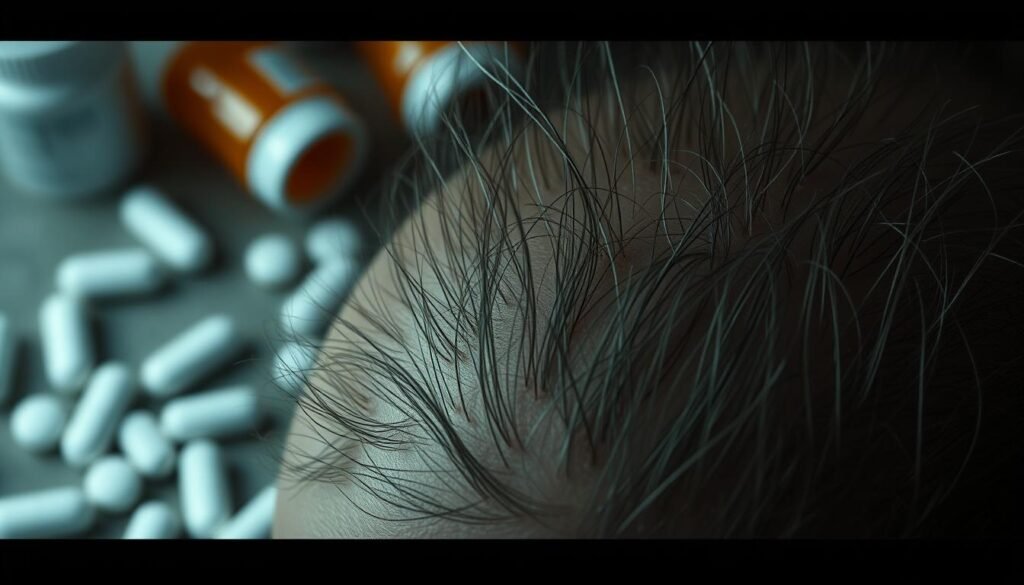
| Medication Class | Potential Hair Loss Effect | Mechanism of Action |
|---|---|---|
| Antidepressants | Increased shedding | Disruption of the hair growth cycle |
| Blood Thinners | Thinning and reduced growth | Impaired blood flow to hair follicles |
| Cancer Treatments | Severe hair loss (alopecia) | Targeted attack on rapidly dividing cells, including hair follicles |
| Cholesterol Medications | Mild to moderate shedding | Disruption of cholesterol synthesis necessary for hair growth |
Lifestyle Choices and Hair Loss
When it comes to maintaining healthy hair, our lifestyle choices play a significant role. From the foods we consume to our daily habits, these elements can either support or hinder the health and growth of our locks. Let’s explore how lifestyle-related factors can impact hair loss and what you can do to promote stronger, more vibrant hair.
Diet and Nutrition
A well-balanced, nutrient-rich diet is essential for hair health. Proper nutrition and hair health go hand in hand. Certain vitamins, minerals, and proteins are crucial for hair growth and strength. Incorporate the following foods into your diet to nourish your hair:
- Protein-rich foods like lean meats, eggs, and legumes
- Iron-rich foods such as spinach, lentils, and red meat
- Omega-3 fatty acids found in fatty fish, walnuts, and flaxseeds
- Vitamin C-rich fruits and vegetables to aid collagen production
Avoid restrictive diets or nutrient deficiencies, as they can contribute to lifestyle-related hair loss.
Smoking and Alcohol Consumption
Unhealthy habits like smoking and excessive alcohol consumption can also negatively impact hair health. Smoking reduces blood flow to the scalp, depriving hair follicles of the vital oxygen and nutrients they need. Similarly, excessive alcohol intake can disrupt the body’s ability to absorb essential vitamins and minerals, leading to lifestyle-related hair loss.
By making conscious choices to nourish your body and adopt healthier lifestyle practices, you can take meaningful steps to support your hair’s vitality and minimize the risk of lifestyle-related hair loss.

“A healthy diet and lifestyle are the foundation for strong, beautiful hair.”
Hair Loss in Different Age Groups
Hair loss is a common concern that affects individuals of all ages, from teenagers to seniors. Understanding the unique causes and characteristics of hair loss at various life stages is crucial for developing effective prevention and management strategies.
Hair Loss in Teens
Teenagers can experience age-related hair loss due to a variety of factors, including hormonal changes, stress, and nutritional deficiencies. It’s not uncommon for young adults to notice thinning hair or increased shedding during this phase of life. Addressing the underlying causes, such as maintaining a balanced diet and managing stress, can help mitigate hair thinning causes by age in this age group.
Hair Loss in Adults
As individuals enter adulthood, age-related hair loss may become more prevalent. Factors such as genetic predisposition, hormonal fluctuations, and environmental stressors can contribute to hair thinning and shedding. Developing healthy hair care habits, including regular trims, gentle styling, and protecting against sun exposure, can help maintain hair health during the adult years.
Hair Loss in Seniors
In the senior years, age-related hair loss often becomes more pronounced. Physiological changes, such as a slower rate of hair growth and decreased blood flow to the scalp, can lead to hair thinning causes by age. Addressing any underlying medical conditions, maintaining a nutrient-rich diet, and exploring age-appropriate treatment options can help manage hair loss in the elderly.
Regardless of age, being aware of the potential causes of hair loss and taking proactive steps to maintain hair health can help individuals of all ages feel confident and comfortable in their own skin.
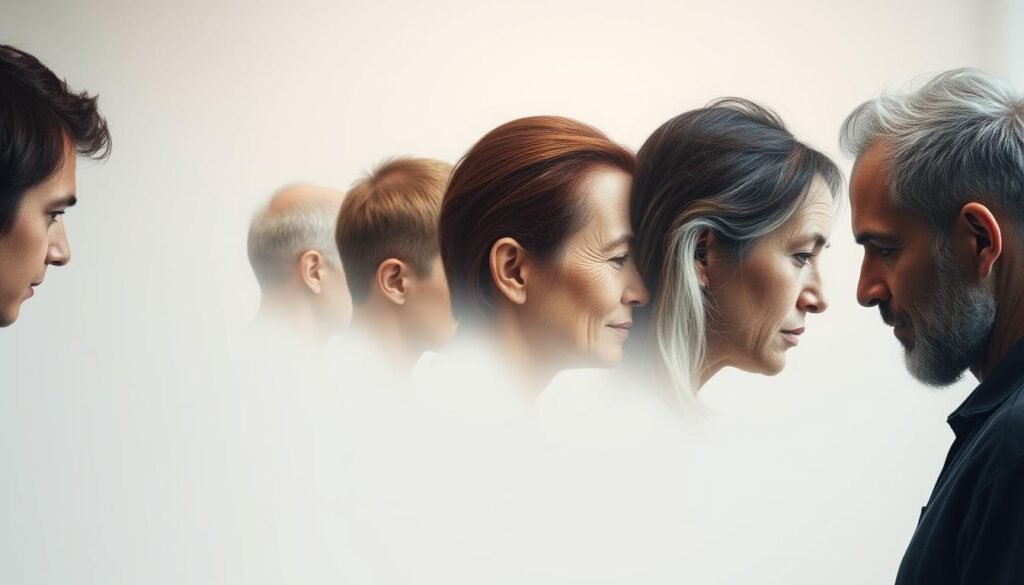
Psychological Impact of Hair Loss
Hair loss can have profound psychological effects on individuals, impacting their self-esteem and overall well-being. The emotional toll of dealing with hair loss psychological effects can be significant, as it can lead to feelings of self-consciousness, anxiety, and even depression.
Self-Esteem Issues
The loss of hair, a prominent feature of one’s physical appearance, can have a significant impact on an individual’s self-perception and self-confidence. Many people with hair loss report feeling less attractive, less feminine or masculine, and more self-conscious about their appearance. This can lead to a decline in self-esteem and a reluctance to engage in social activities or pursue new opportunities.
Support Groups and Resources
Fortunately, there are numerous resources available to help individuals cope with the psychological effects of hair loss. Support groups, both in-person and online, provide a safe and understanding environment where people can share their experiences, seek advice, and find solidarity with others facing similar challenges. Additionally, mental health professionals, such as therapists and counselors, can offer specialized support and guidance for coping with hair loss.
By addressing the emotional and psychological aspects of hair loss, individuals can develop strategies to manage their feelings, improve their self-esteem, and ultimately find ways to embrace their new appearance with confidence and resilience.

Preventive Measures for Hair Loss
Maintaining healthy hair and preventing hair loss requires a comprehensive approach. From adopting proper hair care practices to exploring natural remedies, there are several steps you can take to safeguard your luscious locks.
Healthy Hair Care Practices
Proper hair care is the foundation of preventing hair loss. Follow these healthy practices to keep your hair strong and resilient:
- Gentle shampooing and conditioning to avoid stripping natural oils
- Limiting the use of heat-based styling tools, such as blow dryers and curling irons
- Avoiding excessive brushing or combing, which can lead to breakage
- Protecting your hair from environmental factors, like sun exposure and pollution
- Minimizing the use of harsh chemicals, such as hair dyes and bleaches
Natural Remedies for Hair Loss Prevention
In addition to proper hair care, incorporating natural remedies can help support healthy hair growth and prevent hair loss. Consider the following natural approaches:
- Scalp Massages: Gently massaging the scalp can improve blood circulation and stimulate hair follicles, promoting hair growth.
- Herbal Supplements: Certain herbs, such as saw palmetto and ginkgo biloba, have been found to have anti-inflammatory and hair-nourishing properties.
- Essential Oils: Oils like rosemary, peppermint, and lavender can be applied topically to the scalp to enhance hair growth and reduce shedding.
- Dietary Changes: Ensuring a balanced diet rich in vitamins, minerals, and proteins can help prevent nutritional deficiencies that contribute to hair loss.
By combining healthy hair care habits and incorporating natural remedies, you can take proactive steps to prevent hair loss and maintain a vibrant, healthy head of hair.

| Healthy Hair Care Practices | Natural Remedies for Hair Loss Prevention |
|---|---|
|
|
“Healthy hair is the foundation of a confident appearance. Investing in preventive measures can pay dividends in the long run.”
Available Treatments for Hair Loss
Fortunately, individuals experiencing hair loss have access to a range of effective treatment options. These solutions encompass over-the-counter products, prescription medications, and even surgical interventions, each offering unique benefits and considerations.
Over-the-Counter Solutions
For individuals seeking more accessible and affordable hair loss treatments, over-the-counter options, such as minoxidil (Rogaine) and hair-growth shampoos, can be a viable starting point. These products are designed to stimulate hair follicles and promote regrowth, providing a non-invasive solution for mild to moderate hair loss.
Prescription Treatments
For more advanced or persistent hair loss, prescription-strength medications like finasteride (Propecia) and dutasteride may be recommended by healthcare professionals. These treatments work by inhibiting the production of dihydrotestosterone (DHT), a hormone that can contribute to hair follicle miniaturization and eventual hair loss.
Surgical Options
In cases where non-surgical treatments prove ineffective, individuals may consider surgical hair restoration options, such as hair transplantation. This procedure involves transplanting healthy, natural hair follicles from one area of the scalp to the thinning or Balding regions, providing a more permanent solution for hair loss.
FAQ
What are the most common causes of hair loss?
The most common causes of hair loss include genetic factors (such as male and female pattern baldness), hormonal changes, nutritional deficiencies, medical conditions (like alopecia areata and thyroid disorders), environmental factors (such as pollution and chemical treatments), and stress.
How do the different phases of the hair growth cycle contribute to hair loss?
The hair growth cycle has three main phases: anagen (growth), catagen (transition), and telogen (resting). Disruptions in these phases, such as prolonged telogen phase or premature entry into the catagen phase, can lead to excessive hair shedding and thinning.
What role do genetics and hormonal changes play in causing hair loss?
Genetic predisposition is a major factor in many types of hair loss, including male and female pattern baldness. Hormonal changes, such as fluctuations in testosterone, estrogen, and thyroid hormones, can also significantly contribute to hair thinning and shedding.
How do medical conditions like alopecia areata, thyroid disorders, and scalp infections Cause Hair loss?
Autoimmune disorders like alopecia areata, as well as thyroid imbalances and scalp infections, can all disrupt the normal hair growth cycle and lead to various patterns of hair loss. These medical conditions often require targeted treatment to address the underlying cause and manage the associated hair loss.
What environmental factors can negatively impact hair health and lead to hair loss?
Environmental stressors, such as air pollution, harsh chemical treatments, and excessive heat exposure from styling tools, can all damage the hair and scalp, contributing to hair thinning and loss. Taking steps to minimize exposure to these environmental factors can help promote healthier hair growth.
How does stress affect hair loss, and what can be done to manage it?
Stress, whether physical, emotional, or psychological, can disrupt the normal hair growth cycle and lead to a condition called telogen effluvium, characterized by excessive shedding. Managing stress through relaxation techniques, lifestyle changes, and seeking support can help mitigate stress-related hair loss.
Can certain medications Cause Hair loss as a side effect, and what can be done about it?
Yes, some medications, such as those used for cancer treatment, thyroid conditions, and depression, can contribute to hair loss as a side effect. If medication-induced hair loss is suspected, it’s important to consult with a healthcare provider to explore alternative treatment options or strategies to manage the hair loss.
How do lifestyle choices, such as diet and smoking, impact hair health and hair loss?
A balanced, nutrient-rich diet and avoidance of unhealthy habits like smoking and excessive alcohol consumption can play a crucial role in maintaining healthy hair. Nutrient deficiencies and lifestyle factors can contribute to hair thinning and loss, so making positive lifestyle changes can help promote stronger, healthier hair growth.
How does hair loss affect different age groups, and what can be done to address it?
Hair loss can occur at various life stages, from teenagers to seniors, and the causes can differ based on age. Addressing hair loss concerns in different age groups may require tailored approaches, such as addressing hormonal changes in teens, stress management in adults, and age-related factors in seniors.
What is the psychological impact of hair loss, and how can individuals cope with it?
Hair loss can have a significant impact on an individual’s self-esteem, body image, and overall emotional well-being. Seeking support from friends, family, or support groups, as well as exploring coping strategies and professional help, can be beneficial for managing the psychological effects of hair loss.
What preventive measures can be taken to reduce the risk of hair loss?
Adopting healthy hair care practices, such as using gentle hair products, minimizing heat styling, and protecting the scalp from environmental stressors, can help prevent hair loss. Additionally, incorporating natural remedies and making lifestyle changes, like improving diet and managing stress, can be effective in promoting healthy hair growth.
What are the available treatments for hair loss, and how effective are they?
There are various treatment options for hair loss, including over-the-counter solutions, prescription medications, and surgical interventions like hair transplants. The effectiveness of these treatments can vary depending on the underlying cause of the hair loss and the individual’s response. It’s important to consult with a healthcare professional to determine the most suitable treatment plan.
